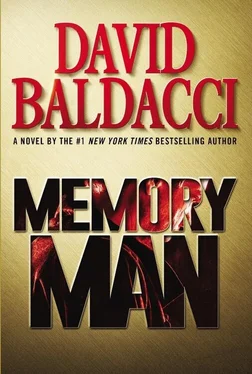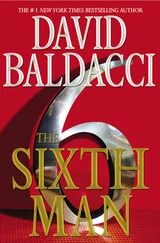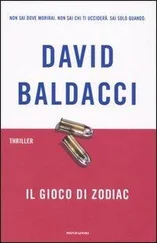He watched the FBI suits doing their thing at a table across the library’s main area. They all looked clean-cut, on the younger side, inexhaustibly professional, starched shirts, ties no doubt as straight as their spines. A few of them looked up occasionally at him, no doubt wondering what a fat weirdo dressed like a homeless person was doing in the middle of their investigation.
Well, at least I trimmed my beard and cut my hair. Or else they’d probably arrest me for looking like a big-ass version of Charlie Manson.
And then the next moment he forgot all about the FBI. He was really no longer in the library at Mansfield. He was no longer looking into the mass shooting here. It was something Lancaster had said.
I’ll be back at the station later this morning. We can grab a cup of coffee and go over things.
Decker would not be at the station later this morning. He had somewhere else to be.
I’ll be at an arraignment.
Sebastian Leopold took solid form in Decker’s thoughts. He went back over every second of their conversation. Every word, every look, every mannerism. Something seemed off, but he couldn’t pinpoint what, when he almost always could. Orphan facts, he liked to call them. There was no one to claim ownership because they were lies.
Yet not with Leopold for some reason. And that was cause for concern but also hope. The reason for hope? Simply Leopold’s existence. Before, Decker had nothing to go on. Now, in the form of the prisoner, he had a layer that had been partially peeled back. And when that happened it couldn’t help but reveal what was underneath.
He left the library and made his way outside.
It was still raining. If anything it was raining harder. The body bag wagons had all gone, and with them the crowd had drained away. No more cell phone candles. But in front of the school was a mountain of flowers, hand-painted signs, Teddy bears.
All drenched and soggy. But the intent was still clear. Still powerful.
He read some of the signs.
RIP Mr. Kramer.
Miss you, Debbie.
Never going to forget you, Eddie.
The town knew who the dead were for a very simple reason, though no names had been officially released. Those people hadn’t come home.
Cammie man had seen to that. Cammie man with no face and the ability to leap long school halls effortlessly. Because that’s what he must have done, to get from point A to the kill zone with “Miss you, Debbie.”
Decker went back to the bleachers and sat there under an overhang to keep dry, though he was pretty much already soaked.
Sebastian Leopold was going to be arraigned in a few hours. Decker planned to be there when he was. Arraignments were typically boring, mechanical stages of the law. Yet there was one important bit of information Decker wanted to see in person.
He sat there for a few minutes more, then, when the rain slowed, he rose and walked back to the Residence Inn. It took him a while because he didn’t move as swiftly as he used to. But it gave him time to think. And he arrived in time for breakfast. He absorbed half the buffet, catnapped for exactly one hour, showered, combed his hair, put his “lawyer” clothes back on, and headed to the courthouse to see exactly what Sebastian Leopold was going to say to the most critical question the judge would ask him today.
Normally, the courthouse would be packed for something like this. A triple homicide and a guy saying he was good for it. Two days ago, it would have been the biggest story in Burlington, maybe the whole state.
But after the slaughter at Mansfield, nobody gave a damn.
Well, one person did.
Decker knew the drill, having testified in the court building countless times during the course of prosecuting folks he’d helped apprehend. He passed through security, nodded to a couple of county sheriffs he knew, and checked the court docket posted on a board near the information desk. Then he headed to the courtroom, where in about twenty minutes Sebastian Leopold would make his first court appearance after walking into the police station and giving himself up.
Decker swung open the heavy oak door and took a seat in the middle of the large room. He was the only one there. No bailiff. No court reporter. No lawyers. The press was covering Mansfield, he reckoned. Part of him would have preferred to be at Mansfield too. But the most important part of him wanted to be right where he was.
A minute later the prosecuting attorney, a woman in her forties, came into the courtroom, passed by Decker, and took her seat at the counsel table. Decker knew Sheila Lynch, but she had not made eye contact. She opened her briefcase, took out a file, and read through it. Decker stared at the back of her neck, which was exposed because her hair was up in a tight, professional bun. Lynch’s skirt and jacket were black and already showing traces of grime. The back of her right shoe had a gouge out of it and her nylons were a bit ragged where the shoe met the stocking.
At five minutes to ten the same door Decker had passed through opened again. He glanced back. Lancaster gave him a tiny wave. Behind her was Captain Miller. He was in uniform today.
They took seats on either side of him.
Lancaster said, “Don’t know what I was thinking about when I said I’d meet you at the station. Of course you’d be here.”
“Why aren’t you at Mansfield?” Decker asked.
Miller answered, “I have been. Since six-thirty this morning. Now we’re here. After this, Lancaster is heading there while I go sit my fat ass behind my desk and deal with crap I don’t want to deal with.”
“Doesn’t answer why you’re here,” said Decker.
“No, I guess it doesn’t.”
Decker continued to eyeball Miller. “I don’t have a gun. I passed through the magnos at the entrance. I can’t shoot the guy.”
“Never doubted that for an instant,” said Miller, smoothing out a wrinkle on his dark blue jacket. “But this is an important case, and so here we are.”
“Were you able to trace Leopold’s real identity? Was he in the Navy?”
“We sent his prints through the FBI’s IAFIS database. No hits.”
Decker said, “He told me he was in the Navy. He had the tat. But maybe he wasn’t in our Navy.”
“Foreigner?” said Miller in a thoughtful tone. “That might explain it.”
“Do you think Sebastian Leopold is his real name?” asked Lancaster.
“I didn’t,” answered Decker. “But I’m not sure now.”
“Well, we can have the Bureau make international inquiries for us,” said Miller. “They can go through overseas databases a lot easier than we can.”
At the stroke of ten the rear door leading into the judge’s chambers opened and the bailiff, a portly man with a handlebar mustache, stepped through. He told them to rise and all four of them did. Decker heard the door creak open and turned to see a young woman dash in and take a seat at the rear. She held a notepad in one hand and a tiny digital recorder in the other.
The press. All one of them. She must be very junior, thought Decker. Or else she would be over covering Mansfield. His brain dug into the big pile of stuff inside his head and pulled out the name.
Alex Jamison .
The woman who’d called him about Leopold. She worked for the News Leader . He’d hung up on her. He turned back around before she could focus on him.
It was at this moment that the black-robed Judge Christian Abernathy stepped into the courtroom. He was old, bespectacled, and frail, and his white hair, what was left of it, sprouted all over his head like bits of fading cotton taped to pink wax paper masquerading as skin. The running bet among the police was how long it would be before Abernathy croaked on the bench, toppling over onto the marble floor. Decker remembered that the man never made it easy for the police to convict anyone, but maybe that was as it should be, he thought.
Читать дальше












